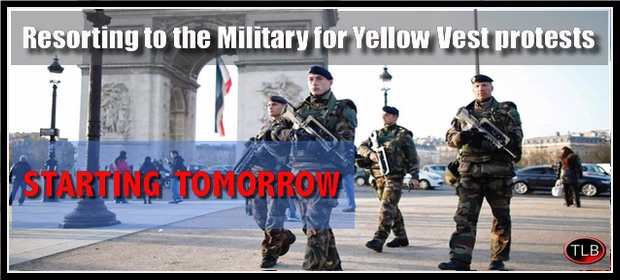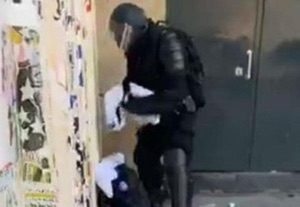
Macron’s dangerous game with the Army
DEFEND DEMOCRACY
France to deploy troops to maintain security during planned weekend protests – Macron
Soldiers will be deployed across France to help maintain security during this weekend’s planned Yellow Vest protests, President Emmanuel Macron has said. The military will secure government buildings and other sites to allow police forces to focus on maintaining public order, the president said, according to comments reported on Wednesday by government spokesman Benjamin Griveaux. About 7,000 soldiers, most armed with automatic weapons, are already deployed across the country in what the military calls Operation Sentinel, which was created to protect sensitive sites following deadly attacks in 2015, AP reported. On Monday, the French government announced new security measures and a ban on Yellow Vest protests along the Champs-Elysees Avenue in Paris and in two other cities, following riots on Saturday.
********
Macron to deploy French army against “yellow vest” protests
ANTHONY TORRES
After Wednesday’s meeting of the council of ministers, French government spokesman Benjamin Griveaux announced that President Emmanuel Macron would activate army units during this weekend’s “yellow vest” protests. This is the first time since the 1954–1962 war in Algeria that the army is to be mobilized in police operations on French soil against the population.
Griveaux announced that the operation would have the task of “securing fixed and static points in conformity with their mission, that is to say principally the protection of official buildings.” He justified his recourse to the armed forces by claiming this was necessary to allow the police forces to “concentrate on protest movements and on the maintenance and re-establishment of public order.”
Today, Defense Minister Florence Parly is slated to meet representatives of the police forces in the late afternoon to discuss operational details on the upcoming deployment this Saturday.
The mobilization of army units comes on top of a series of repressive measures the government announced on Tuesday. These include allowing the state to ban protests if “radicals” attend them, increasing fines for participating in a banned protest from 38 to 135 euros, the setting up of “anti-hooligan brigades” of police, the use of drones, the firing of chemical agents allowing police to trace demonstrators, and the use of police checkpoints to stop and identify demonstrators.
The resort to the French army to threaten protests against social inequality marks a historical turning point of international significance. A wave of strikes and protests is spreading across the world, driven by mounting political anger at decades of austerity and militarism. These range from protests by the “yellow vests” to strikes against decade-long wage freezes across Europe, to the mass protests against the Algerian military dictatorship, to the strikes of US teachers and Mexican maquiladora workers and mass strikes in Sri Lanka and India. [ER: this also includes the Brexit vote]
Macron’s decision to deploy the army against the “yellow vests” is part of the increasingly desperate attempts of the ruling class internationally to intimidate the rising political opposition among workers and, failing that, to create conditions to try to repress it through force of arms.
The government is deploying the army amid the media frenzy that followed the looting of the Champs- Élysées avenue in Paris during last Saturday’s “yellow vest” protests. But there is no hard evidence that “yellow vest” protesters carried out this looting. Top officials, including Paris mayor Anne Hidalgo, have said these actions were committed by far-right groups who exploited a breakdown in the chain of command of the police forces, some of whom were filmed joining in the looting of shops on the Champs- Élysées.
 Despite the murkiness of Saturday’s events, the government is responding by rapidly stepping up threats against protesters. Interior Minister Christophe Castaner (pictured) brazenly declared that on Saturday, police were facing “10,000 hooligans,” implying that the vast majority of peaceful “yellow vest” protesters were violent criminals whom police could treat as such. Speaking about the violence on Saturday, Macron for his part provocatively declared that supporters of the “yellow vest” movement “have made themselves complicit in it.”
Despite the murkiness of Saturday’s events, the government is responding by rapidly stepping up threats against protesters. Interior Minister Christophe Castaner (pictured) brazenly declared that on Saturday, police were facing “10,000 hooligans,” implying that the vast majority of peaceful “yellow vest” protesters were violent criminals whom police could treat as such. Speaking about the violence on Saturday, Macron for his part provocatively declared that supporters of the “yellow vest” movement “have made themselves complicit in it.”
The looting Saturday is only a pretext for the implementation of plans that have been long prepared. A possible resort to the army inside France has been publicly discussed for several years, since the then-ruling Socialist Party (PS) began calling for dispatching the army to working class districts of Marseille and other cities under President François Hollande.
The use of troops to crack down on domestic political opposition underscores the correctness of the WSWS’s long-standing opposition to fraudulent claims that the “war on terror” launched by Washington  and its European allies aims to protect the people. The PS began Operation Sentinel under the state of emergency it declared after the Nov. 13, 2015, terror attacks in Paris, perpetrated by Islamist networks the NATO powers were using in the Syrian war. Now Macron, a former minister in the PS government, is using these supposedly “anti-terror” troops to reinforce the mobile police squads he is throwing against the “yellow vests.”
and its European allies aims to protect the people. The PS began Operation Sentinel under the state of emergency it declared after the Nov. 13, 2015, terror attacks in Paris, perpetrated by Islamist networks the NATO powers were using in the Syrian war. Now Macron, a former minister in the PS government, is using these supposedly “anti-terror” troops to reinforce the mobile police squads he is throwing against the “yellow vests.”
Sensing itself to be deeply isolated and despised by workers internationally, and terrified by rising protests in both France and Algeria, the financial aristocracy intends to wage ruthless class war. A February article in the Monde diplomatique titled “Class struggles in France” pointed to the panic seizing broad sections of the ruling class amid the growing political opposition that is for now largely peaceful but also very deep in the French and international working class.
The monthly wrote, “Fear, not of losing an election, or failing to ‘reform’, or to take stock market losses. But of insurrection, of revolt, of destitution. For a half century, the French elites had not experienced such a feeling. … The director of a polling institute mentioned for his part ‘big CEOs who were indeed very worried,’ and an atmosphere ‘that resembles what I have read about 1936 or 1968’ (the two French general strikes). There is a moment where they tell themselves, we have to be able to spend a lot of money to avoid losing what is essential.”
And so the financial aristocracy is pouring resources into repression and breaking with longstanding guarantees that the army would not be sent to fire on the population. After former PS presidential candidate Ségolène Royal called for sending the army to Marseille in 2013, history professor Jean-Marc Berlière reviewed the history of the French army’s use for police operations in an interview in Le Monde.
In the 19th century, Berlière explained, the army’s repeated murder of workers, including women and children, during strikes and May Day rallies provoked enormous class anger: “Massacres like those that periodically took place—at Fourmies, Narbonne, and so on—seriously hurt its image, which was already badly damaged by suspicion of social and political collusion due to its engagement during strikes on the side of the employers.”
After the October 1917 Revolution in Russia during World War I, which saw mass mutinies in the French army, the government decided it could no longer trust the army for domestic policing. “After the victory and the sacrifices of the 1914–1918 war, it was no longer possible to use the victorious army for internal operations,” Berlière said. Asked whether the French army was active after World War I in domestic policing inside the borders of current-day France, he added: “Basically, no. The political risk was too great: what would be the attitude of the conscripts?”
After the army’s infamous resort to mass torture and murder in a failed attempt to keep Algeria under French rule during the 1954–1962 independence war, Macron is again turning to the army. His hailing last year of Nazi-collaborationist dictator Philippe Pétain as well as Georges Clemenceau—who as interior minister before World War I oversaw army operations leading to the murder of 18 workers—reflect continuous official attempts to legitimize repression.
This underscores the reactionary character of continuous proclamations from within the political establishment that left-wing, socialist and working-class politics are irrelevant and dead. [ER: we may describe the Yellow Vests as primarily working class although not exclusively. But they wouldn’t describe themselves as left-wing or socialist.] They create conditions where a deployment of the army against working people, lacking any shred of legitimacy, proceeds without meaningful opposition in official French life. The central task, in which the “yellow vest” protests mark an initial step, is to independently mobilize the growing political opposition in the working class against this drive to military-police dictatorship.
********
Unanswered questions on French police role in Saturday “yellow vest” clashes
ANTHONY TORRES & ALEX LANTIER
The escalation of repression by the Macron government after Saturday’s clashes with protesters on the Champs-Élysées in Paris, during the 18th weekly “yellow vest” protests, raises the most serious questions as to the government’s role. No evidence has been provided that the violence was caused by “Yellow Vest” protesters. But the Élysée is seeking to tear up the right to protest on the basis of these murky events, which sections of the state apparatus itself have attributed to far-right forces.
On Monday, the government announced that protests could be banned in areas where violence had previously occurred, if police declare that “extreme elements” could be present among the protesters. But it is precisely the question of the police’s own role that is raised by Saturday’s events, which saw numerous buildings set on fire, notably Fouquet’s restaurant.
The police, which were filmed ransacking the merchandise store of the Paris Saint-Germain football club (see image), are now threatening the “yellow vests” with a major escalation of violence. Frédéric Lagache, the general secretary of the Alliance police union, which is tied to neo-fascists, called for the injuring of demonstrators:
“We should be willing to clash with them and maybe cause some injuries. We’re not going up against choir-boys.”
Interior minister Christophe Castaner added: “On Saturday, on the Champs-Élysées, there were no Yellow Vests, just people acting in a logic of war who wanted to take back the Arc de Triomphe. There were 10,000 rioters on the Champs-Élysées.” That is, the anti-riot police force just created by the government could treat all “yellow vests,” including peaceful protesters, as looters to attack and injure.
This gross amalgam, concocted even as suspicions remain as to the role of police themselves, raises the most serious questions. Is the government using provocations organized with the support of elements in the police to justify an intensification of repression? These questions are raised by declarations from top figures in the state apparatus, who possess considerable information provided by the police and domestic intelligence agencies.
 On Saturday, the Socialist Party mayor of Paris, Anne Hidalgo, reacted to the violence by declaring: “What I saw tonight were extreme right groups who want to destabilize democracy, and groups of looters.”
On Saturday, the Socialist Party mayor of Paris, Anne Hidalgo, reacted to the violence by declaring: “What I saw tonight were extreme right groups who want to destabilize democracy, and groups of looters.”
She also pointed to the responsibility of police for the violence that erupted on the Champs-Élysées: “It ought to be possible to take control of a situation like the one we just passed through.”
Naturally, Hidalgo chose her words and took care not to express herself in a way that would raise questions as to the role of the state machine, of which she is herself an important cog. But it is necessary to ask the questions which are directly posed by such statements.
If far-right groups are indeed responsible, then which far-right groups are they? Who are their leaders, and who gave orders to set different shops and buildings on fire? Are there ties between the far-right groups that ransacked the Champs-Élysées, according to Hidalgo, and those, for example, who are now appealing the conviction of their ex-members for the fascist murder of Clement Méric?
Given the vast powers that the state has to monitor electronic communications and mobile phones, how is it possible that they do not know the identities of those responsible?
And if, as Hidalgo claims, the responsibility for the violence lies with far-right forces that threaten democracy, what conclusions should one draw about the role of the government? Why are Macron and his ministers silent about the role of the far right, besides the fact that this discredits their claim that the “yellow vests” and those who support them—some 70 percent of the French population—are responsible for the violence?
Is the government, which is largely unpopular because of its policies of austerity and militarism on behalf of the super-rich, using right-wing provocations to crush by force the opposition of workers and youth to its diktat?
An analysis of the remarks of the junior interior minister, Laurent Nuñez, on Monday with RTL, raises the same questions as the remarks of Hidalgo.
Asked why the police did not manage to turn back the looters, Nuñez replied: “In the pursuit of operations, we were less aggressive and less proactive than normal.”
Nonetheless, he defended the record of the police forces: “The work of the police forces is absolutely not  placed in doubt.” But their work is in fact in doubt, as videos have been shared widely on social media showing police looting stores on Champs-Élysées (see image). Nuñez’s statements amount to a cover-up of the dubious and murky role of his own forces.
placed in doubt.” But their work is in fact in doubt, as videos have been shared widely on social media showing police looting stores on Champs-Élysées (see image). Nuñez’s statements amount to a cover-up of the dubious and murky role of his own forces.
Given Hidalgo’s allegations fn the role of neo-fascists on Saturday, the question is also raised as to whether the police forces’ well-known sympathy for the far right played a role in their decision to be “less aggressive” against the looters.
Nuñez alleged on RTL that the popular hostility toward the use of rubber bullets, which have put out the eyes of dozens of protesters, was to blame, as it left the police demoralized and terrified to act in the face of violent protesters. This explanation does not hold water. In fact, the police actions on Saturday were both aggressive and proactive against the “yellow vests.” It is against the looters that there was a demobilization of the police.
On Saturday, the Paris police prefect planned for the deployment of 5,000 agents, or approximately 40 companies of riot police, including 1,500 specifically tasked with arresting violent protesters. The day before the weekend, a police source confirmed to the JDD that it anticipated the presence of anarchist “Black Bloc” protesters who would “be looking for a fight.” As a result, stepped-up police searches were carried out on roads leading to the capital city and also in Paris train stations in order to apprehend those police alleged to be violent protesters.
Police repression began earlier than usual at Saturday’s protest, as police fired water cannon and heavy volleys of “incapacitating” tear gas from the military police’s armored vehicles around 11 a.m. A helicopter overflew the Champs-Élysées district.
Despite this vast police apparatus, including barricades and police checkpoints set up all around the Champs-Élysées, masked and armed demonstrators were somehow able to reach the avenue and pillage the stores—which certain policemen appear to have begun to do, as well.
No serious investigation has been made of these widely reported facts, or of these statements by top officials, that together raise serious questions about the Macron government, the state and the entire political establishment.
But workers and youth have every right to politically oppose attempts to install a police-state regime violating basic democratic rights, and the ruling elite efforts to justify this by claiming thousands of “yellow vest” protesters are responsible for acts of violence that they did not commit.
************




